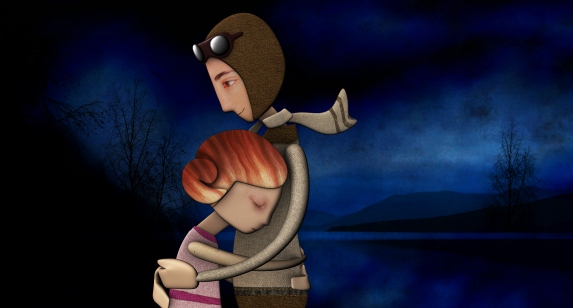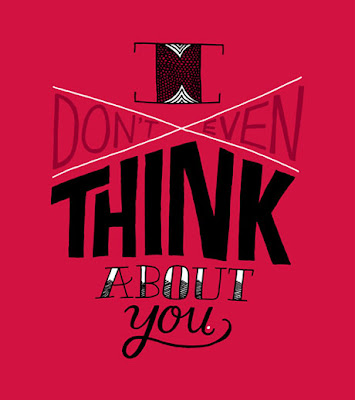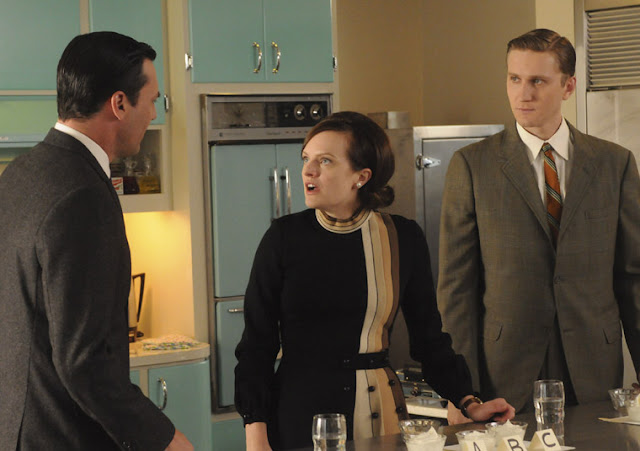Wow, wow, wow. This week's episode of Mad Men entitled "The Other Woman" made me rant and cry in equal measure. Crucial decisions were made by the characters I care about the most, with a little Don and Meghan on the side. The above image pairing reminds me of a feminist short film by Chilean director Cecilia Barriga called A Meeting of Two Queens (1991), in which she edits footage from the works of two glorious queer Hollywood Icons--Greta Garbo and Marlene Dietrich--so that they appear to be carrying on the grandest and most tempestuous love affair.
The longing and connection that registers between Joan and Peggy in the above image isn't quite what happens at episode's end, but I like the fantasy. This season, their relationship to each other has become deeper and stronger, and the show feels like it's finally getting to the "click" moments that became synonymous with some of the feminist values of that late sixties time period. The valuable emotional screen time Peggy and Joan possessed this week was countered by sharp contrasts, repeatedly made, of showing a bunch of dicks in a room. Also, if one had any lasting sympathies toward Pete Campbell, they were probably truly annihilated during this episode. I take some hasty notes while I am watching, and I wrote "Pete is disgusting and coarse and a dickhead and I hate him." I also called him a "scum-bucket." Granted, I was a little intoxicated while watching, for my partner and I had a couple of Cersei's Ruins beforehand.
This drink is a variation of a drink made at the Patterson House in Nashville TN. I do not like my drink diluted, so instead of putting ice in the drink, I like to stick the highball glasses in the freezer before pouring so that they are nice and chilled. Oh and the drink is called Cersei's Ruin because it's SO GOOD, it will make you sleep with your hot brother (thank you Game of Thrones).
Here's the recipe (makes one drink):
2 ounces high quality Bourbon
1/4 ounce fresh squeezed lemon juice
1/2 ounce St. Germain Elderflower Liqueur
13 drops lemon bitters
Absinthe Verte to coat the glass
garnish with lemon peel
Take your chilled glass and swish some Absinthe Verte around to coat it, then in a shaker, shake the other ingredients, strain into a glass, and garnish. Yum, yum. The flavors are sophisticated, well-balanced, and have a kick!
If having to face Pete doesn't cause one to drink already, this drink will certainly take the edge off--but also may contribute to a bit more passionate attachment to Mad Men than usual. My partner was kind enough to talk me down a couple times. I would not be opposed to saying goodbye to Pete for good in the season finale in two weeks (Sob. I'll miss you Mad Men. Not Pete, though). Elevator Shaft fall?
The show opens with a bunch of dicks, dicking around, arguing over how best to get a bunch of dicks to buy a dick-substitute, which is then rationalized as a feminized fetish object--"At Last. Something Beautiful You Can Truly Own"--a Jaguar sports car. For these men of the late 60s, this car is the proverbial "other woman," who will satisfy the fraught and precarious masculinity they so desperately need to maintain, especially in the face of the social changes underway.
Peggy is shut-out of this dickfest, where they are all swinging their wangs and eating lobster. In fact, she saves the Chevalier Blanc campaign with some fast and fancy thinking (Lady Godiva saves the Beatles wanna-be), but she gets no credit for her work, as Don reminds her that it's MG's campaign. When she protests, he tells her she can go to Paris, and literally throws money in her face. WTF Don? Even Ken Cosgrove's "pact" with Peggy just doesn't feel satisfying to her. This confrontation with Don is the nail in her and Don's Samsonite Suitcase, for she starts taking meetings with other agencies, and is snagged by a competing firm that recognizes her worth and gives her more than her asking price. I was simultaneously so proud of Peggy, and so sad, because I'm not sure that I can continue to watch this show if she actually leaves SCDP for good. If she makes it to the top somewhere else, will she take Ken with her? The pact implies equivalency, but in this episode, Peggy feels like it's all lip service, and she must be the one to make a change.
When Peggy gives notice, Don lashes out with "Let's not pretend that I'm not responsible for every good thing that ever happened to you," and asks her for her "number." Sure, he's hurt, but this kind of comment is exactly why she is leaving. At this point, there is no number high enough to keep her putting up with Don's bullshit. As she tells Don, he would do the same thing. When he grabs her hand, Peggy can barely keep it together. Hell, I totally lost it.
"Don't Be a Stranger." Damn, how can these two people whose lives are so interconnected be saying goodbye for good? Say it isn't so! Will she be begged back for the finale?? I just don't know.
Meanwhile, last week's episode where Joan and Don test drove the Jag and tippled at the bar drove home the economic and romantic realities of Joan's situation. Greg has filed for divorce, he's staying in Vietnam, and she's a single working mother with a new baby and no real financial security. When that low-life scum-bucket Pete meets with the head of the dealer's association, Herb Rennit, about SCDP's stake in the Jaguar account, Herb lets on that he would be able to put a really good word in for them if they are able to set up a "date" with Joan. Pete plays pimp, the hateful turd.
Then the sniveling weasel takes the proposition to Joan, who is understandably outraged and disgusted, and claims that they couldn't afford her. The ignorant dolt then tells the partners that Joan is willing "for a price," which isn't how I read that scene, nor Joan I bet, but that bottom-feeding f**k wad perceives things this way. Don thankfully walks out of the meeting, but the four other dicks--Bert, Roger, Pete, and Lane--think on it some more, and outvote Don, believing that $50,000 might be proper remuneration for sleeping with some disgusting pig. Lane meets with Joan in private, tells her not to do it, but then says that if she's considering it, she should demand a 5% active partnership in the company (so that he isn't caught with his hand in the cookie jar). Oh boy. The stakes are so high here for Joan, and this kind of decision shouldn't BE a decision she has to make. She brings the lecherous creeper/Pete into her office and informs him of her demands--no negotiations, buddy. I like this exchange, although my heart was just breaking.
Joan: "Which one is he?"
Lowlife scum-bucket: "He's not bad."
Joan: "He's doing this."
MG comes up with his spiffy catchphrase, and Don runs with it. Pete comes in to tell Don that he's sure that creative will win the day, but that there are no other impediments keeping them from Jaguar. He even implies that it was all Joan's idea, the loathsome toad. Don goes over to Joan's apartment to talk her out of this "date," and she appreciates his friendship and support, even if it's too little, too late. What one does not realize, until after the following sequences unfold, is that Joan has already gone through with "it," making a devastating, but game-changing decision for herself.
The episode is constructed in such a way that the parallel editing sequence cutting back and forth between Joan's date with Herb and the pitch for Jaguar implies that they are occurring simultaneously--right up until the end when we see Herb's face in smug satisfaction. I cried through this whole sequence, it hurt so much to watch Joan tolerate Herb's repulsive, lecherous desire. When Herb states "let me at 'em" while groping for Joan's breasts, she turns her back, and her zipper to him, slowly pulling the dress down from her shoulders. The wrenching look on Joan's face made my heart stop.
At the same time, Don is pitching the car as if it's a beautiful woman that a man can finally "own" to a room full of smug dicks, and when Mad Men stops for a commercial break, it's for a Stella Artois commercial whose ad line is "She is a thing of beauty." I shit you not. I couldn't find the exact ad, but here's a culture jammed version that will give you an idea of why it pushed me clear over the edge.
This Stella Artois campaign started in 2010, but it's proven so successful, that they're sticking with it. This ad completely undercuts any progressive commentary on gender politics this show might be attempting, and gets at the heart of what's wrong with Mad Men. This ironic kind of wink-wink retro-sexism seems to get a pass because it's cool, Sixties cool. Here, this week, the writing and representations have made it glaringly obvious that women are faced with impossible choices, and that this kind of treatment is sexist, unjust, and deeply upsetting. Then we get some retro commercial that sweeps all that painful, messy stuff away. WTF!! Oh, and tell me that this ad doesn't remind you of a certain Zou-Bisou-Bisou?
The show seems to ungracefully ride the line between critique and celebration of these outdated gender roles, suggesting moments of critique, but then ultimately recuperating all this bullshit into a palatable, retro-sexy package. Is it wrong to want more from this show? I don't think so. Are we going to REALLY deal with racism and sexism next season? How about Stonewall and homophobia? Rise to it Matthew Weiner.
Speaking of Zou-bisou-bisou, Meghan comes into the office at SCDP for a little "quickie" boost of confidence on her way to her audition. Don has made it clear earlier in the episode that he's not thrilled with the possibility that Meghan might be called away to Boston for rehearsals for a couple of months; they are still trying to negotiate the changes her decision has wrought on their relationship. Still, Don's trying, and that's more than we can say for almost every other male character on the show. I love when Stan tries to get Meghan back in the game, and she says, "Jaguar: It's your problem, not mine." Nice, Meghan.
Meghan's audition is extremely disheartening, and she begins to realize that for so many roles, it doesn't matter if she ever utters a word. Three men sit on a couch and subsequently ask the "sweetheart" to step forward and spin around. She is a "thing of beauty" to them, and it's not clear that Meghan will be valued beyond this idea. All her excitement and enthusiasm is shattered by a couch full of dicks.
When Don returns home from the pitch, they have a discussion which is quite moving, and gives me high hopes for their future relationship. Don tells her that he doesn't want her to fail, and she points out that if she's forced to choose (between acting and Don), she'll choose him, but she'll hate him for it. Pretty honest words! Don has figured out that he doesn't want another Betty, and they end this scene in closeness and respect. Baby steps. These two have come a long way from that Howard Johnson's parking lot!
The next day, when the partners receive the news that they've won the Jaguar account, Joan is right there with them, driving home to Don that he did not succeed in stopping her (and making him wonder, perhaps, how much her sacrifice affected the winning of the account). Of course, that skeezy little pissant seems fine with the sea change that puts Joan in a position of power, however small. He's still an unforgivable slug.
After all this painful viewing, the one redeeming moment that stands out, and leaves me with more questions than answers, is the episode's final image. Peggy walks out of her office with her giant coffee thermos, turning her back on the revelry, and as she steps onto the SCDP elevators for what may be the very last time, she smiles. And The Kinks burst into song (the music choices made on this show really are f**king genius). What's going to happen to Peggy??? Is she going to get her own spin-off series?
**Just so you know, I re-watched the episode stone-cold sober and cried in all the same places. This episode was really powerful, and has me wondering where the season finale will take us. I hate waiting.













































